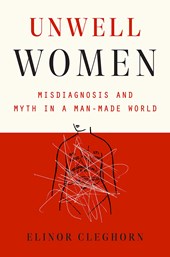Unwell Women: Misdiagnosis and Myth in a Man-Made World
June 03, 2021
Historically, women have been defined by their biology, namely their uterus and ability to bear children. Elinor Cleghorn's new book argues for medicine to look beyond biological evidence and communicate with and listen to those who know women’s bodies best: women themselves.
Unwell Women: Misdiagnosis and Myth in a Man-Made World by Elinor Cleghorn, Dutton
I’ve been a very health-conscious person since high school, but reading Unwell Women by Elinor Cleghorn makes me question how much my ideas of female wellness have been skewed by gender inequality and sexism. While it’s a dark history to unpack, it’s ultimately one that makes me feel more empowered in my mental, emotional, and physical self than a lot of other books about health have.
This topic reminds me of Brene Brown's interview with physician Jason Karlawish, M.D. on her podcast "Unlocking Us" in which he discusses his book The Problem with Alzheimer's and the gender and racial politics involved in the disease (among 65 year olds, 1 in 5 women compared to 1 in 11 men will develop Alzheimer's) as well as the healthcare system (60% of all Alzheimer’s caregivers are women). In relation to the gender disparity of the disease and its effect on attempts to find a cure, Karlawish says: "I had someone else ask me, 'So I guess if Alzheimer’s happened to men in their 40s, we’d have a cure now?' I said, 'Well, maybe not a cure, but I think we’d have a better system of care.'"
This fact is so frustrating and saddening to me and I'm sure many others who have known women who have passed away from any illness that could have been caught earlier if healthcare providers were more receptive to female patients’ pain. The simple fact that a sexist system has been surreptitiously controlling whether women lived, died, or suffered in any way from illness is difficult to come to terms with; A more inclusive and equal healthcare system could have saved a loved one’s life.
Women are more likely to be offered minor tranquilizers and antidepressants than analgesic pain medication. Women are less likely to be referred for further diagnostic investigations than men are. And women’s pain is much more likely to be seen as having an emotional or a psychological cause, rather than a bodily or biological one. Women are the predominant sufferers of chronic diseases that begin with pain. But before our pain is taken seriously as a symptom of a possible disease, it first has to be validated–and believed–by a medical professional.
Women have fought and continue to fight to gain autonomy and independence in the world, but the centuries deep history of androcentrism in medicine (and the world in general) is hard to redirect. In Unwell Women, Cleghorn thoroughly explains the history of medicine–from the sex-shaming male physicians of the 1800s, to the health campaigning feminists of the ‘60s and ‘70s like Perkins Gilman whose efforts have made the contraceptive pill and hormone replacement therapy safer, to the modern-day efforts by everyday women who are unabashedly speaking about their own bodies in order to help other women who are still being ignored or invalidated by the healthcare system. The throughline is that, historically, women have been defined by their biology, namely their uterus and ability to bear children. Sometimes, women are revered for their bodies and other times, like in the mid 1800s, they were diagnosed with hysteria, “a disease with a maddening array of symptoms, all of which began with ‘irritation’ of the clitoris” according to the book On the Curability of Certain forms of Insanity, Epilepsy, Catalepsy and Hysteria in Females by London gynecologist and obstetrician Isaac Baker Brown. Conversely, Unwell Women makes a strong argument for medicine to look beyond biological evidence and communicate with and listen to those who know women’s bodies best: women themselves.
Throughout the book, Cleghorn also makes clear the more difficult barriers placed before women of color when seeking treatment for pain and the lower quality treatment that they receive overall. It’s clear that through much of American history, healthcare was implemented to maintain white supremacy, such as when forcibly sterilizing Black women was marketed as a way to improve their economic, health, and community standards as well as to “improve the high maternal and infant mortality rates and the ‘poverty and degradation’ that disproportionately affected those families and communities.”
Though the book is research-heavy, Cleghorn’s personal investment in the topic invigorates the text with a fierce and courageous voice. She was diagnosed with the incurable disease of lupus in 2010 after suffering with strange pains for many years, and when she scoured medical history to find out how other women with lupus live/lived with the disease, she realized:
[T]he observations of their disorders and symptoms in those clinical studies told only a fragment of their stories. Their notes gave clues about their bodies but nothing about what it meant to live inside them. I tried to imagine what it felt like to be an unwell woman struggling with a disease that resisted medical understanding at these different points in history. I felt an intimate kinship with them. We shared the same essential biology. What has changed is not the female body itself, but medicine’s understanding of it.
I'm grateful for Cleghorn's comprehensive and empowering book, and other memoirs of women's experience with illness (see Constellations: Reflections from Life by Sinéad Gleeson) like it. While not easy, it’s essential reading for us all, so that we can start taking women more seriously and–with the right laws passed, more funding allotted to research, more woman doctors practicing, and more public conversation about women’s bodies–we can take care of women more seriously too.




